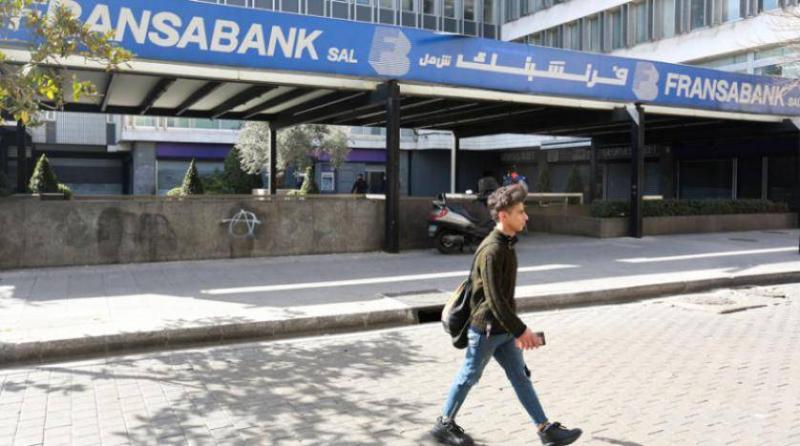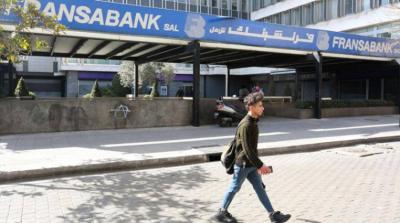The banking sector in Lebanon has received another blow, this time from the judiciary, with a ruling issued by the enforcement court in Beirut mandating the seizure and forced execution on the assets of the "Fransabank," starting from its main branch in the Hamra area and extending to all its branches in the capital and Lebanese governorates, based on a lawsuit filed by a depositor.
This action not only affects the sanctioned bank but may also include other Lebanese banks facing similar lawsuits from depositors. A judicial source expressed astonishment at what has transpired, stating, "What we are witnessing proves that we are living in madness," emphasizing that "addressing such a crisis can no longer be managed through judicial references, but requires intervention from the Cabinet and the President," considering the situation to be akin to "shooting oneself in the foot."
The decision issued by the head of the enforcement department in Beirut, Judge Mariana Anani, on Tuesday, March 15, mandated "the seizure of all shares, properties, and assets of Fransabank and its branches and companies across Lebanon, preparing for them to be auctioned off, due to the bank's failure to comply with the full payment of the financial deposit and its accessories owed to the plaintiff depositor Eyad Ibrahim, a member of the Depositors' Cry Association."
The execution order included "all assets of the sanctioned bank (Fransabank), including cash and funds in its vaults, at its main branch in Hamra and branches located in areas such as Tabbariyeh, Al-Sayfi, Ashrafieh, Al-Jnah, Mar Elias, Ain Al-Mreiseh, Tarik Al-Jadida, Sudikou, Ras Al-Nabaa, Ashrafieh-Sassin, Al-Msaitbeh, Verdun, Bab Idris, and Al-Adlieh (all of which are located within the administrative area of Beirut)," and the enforcement officer was tasked with taking the necessary actions.
These actions did not stop at the bank's branches in Beirut, as Judge Anani also tasked the relevant enforcement departments outside Beirut with implementing the necessary steps and enforcing the seizure on the branches of Fransabank within their jurisdictions per the ruling.
The enforcement measures came after Judge Roula Abdullah rejected the bank's request to suspend the execution, and this ruling became effective. On Wednesday afternoon, employees from the enforcement department in Beirut moved to the bank's headquarters in Hamra and began the enforcement and seizure procedures on all its assets. They then proceeded to its branch in Ashrafieh, closed and sealed its cash vaults with red wax, accompanied by the Internal Security Forces.
This decision left negative echoes in the streets, especially with reports of salary freezes for employees, particularly officers and personnel of the Lebanese army and security forces, which have now become uncertain. However, a judicial source involved with this decision tried to mitigate its implications, stating that the judiciary "is now standing between the two extremes of collecting people's and depositors' rights, and preserving the banking sector without exploiting these procedures in political conflicts." He clarified that "the enforcement court adjusted its decision to seize the large vaults and sealed them to prevent the bank from disposing of its assets while keeping the counters and ATM cash available so that people can withdraw their funds and salaries."
Fransabank announced in a statement its commitment to Judge Anani's ruling, saying it "apologizes for its inability to meet the needs of its clients, especially in paying salaries of public sector employees and others." It explained that the complainant, Eyad Ibrahim, "had closed his account and retrieved his entire deposit," noting that it "remains committed under the law."
However, a judicial source close to the court that issued the enforcement order clarified that Ibrahim's deposit was $35,000, and requested the bank to dispense his deposit, but the bank refused, claiming he was only benefiting from the Central Bank's circular. The judicial source told "Asharq Al-Awsat" that depositor Eyad Ibrahim "filed a lawsuit before the judge for urgent matters and won, requiring the bank to pay the deposit, leading the bank to issue a bank check in Ibrahim's name and deposited it with the notary for him to collect, thus closing his account entirely." The source added, "The depositor could not open an account in any of the banks or cash the check, prompting him to file another suit before the enforcement court, which sent a notice to the bank demanding either to reopen an account for the depositor or to cash the check. However, the bank refused to comply, which led the court to issue a judgment for the enforced seizure of the bank's assets."
The source stated that the action taken was legal, adding that the judiciary "is obliged to enforce the law and present the assets for public auction, just as it would if the bank had funds owed by any debtor, where the debtor's assets would be auctioned off publicly in the event of default." He mentioned that it is natural for a citizen to resort to the judiciary to recover their rights.
Regarding the economic and financial implications of these events, financial and economic expert Professor Jassem Ajaka stated that this decision will have major negative repercussions, not just on the banking sector but also on depositors' funds. In a statement to "Asharq Al-Awsat," he remarked that "there is a rampant attack on the banking sector more than anything else, and this is not a defense of the banks but of the rights of the depositors within them," reminding that "the salaries of half of the Lebanese public sector employees are deposited in Fransabank, including judges and military officers."
He emphasized "the urgent need for the Lebanese government to address this crisis and to acknowledge that the country lacks dollars or foreign currency," considering that this measure "will push other banks to close and jeopardize Lebanese deposits, which primarily serves the banks." Ajaka concluded, "While this measure has served one depositor, it has squandered the rights of thousands of other depositors."
For its part, a source within "Fransabank" confirmed to "Asharq Al-Awsat" that the decision "will have extremely negative outcomes, especially as the closures targeting the bank's vaults and seizing its assets will deprive depositors of withdrawing part of their funds and will also prevent public sector employees from receiving their salaries." The source mentioned that "their problem is no longer with Fransabank but with the court that issued this decision and rushed to implement it without considering its disastrous consequences."




